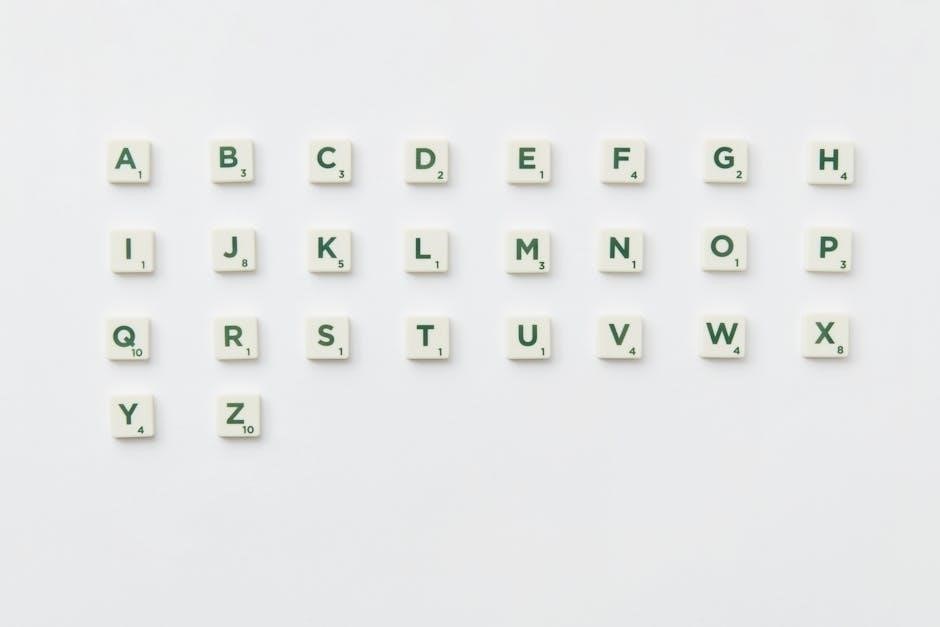A Good Moral Character Letter for immigration is a document attesting to an applicant’s moral integrity, honesty, and ethical behavior, crucial for citizenship or immigration benefits․
1․1 Understanding the Purpose of a Good Moral Character Letter
The purpose of a Good Moral Character Letter is to provide evidence of an applicant’s moral integrity, honesty, and ethical behavior, which are essential for immigration benefits․ This letter serves as a testament to the applicant’s positive character traits, such as reliability, trustworthiness, and respect for the law․ It is typically written by someone who has known the applicant for a significant period, offering personal insights and specific examples of their good conduct․ The letter plays a critical role in immigration applications, as it helps officers assess whether the applicant meets the moral standards required for citizenship or residency․ A well-crafted letter can significantly strengthen the applicant’s case, demonstrating their suitability to contribute positively to society․
1․2 The Role of the Letter in Immigration Applications
A Good Moral Character Letter plays a crucial role in immigration applications by providing a personal and detailed assessment of an applicant’s moral integrity․ It serves as a key document to support the applicant’s case, offering insights into their ethical behavior, reliability, and respect for the law․ Immigration officers rely on this letter to evaluate whether the applicant meets the moral standards required for citizenship or residency․ By highlighting specific examples of good conduct, the letter strengthens the application and demonstrates the applicant’s potential to contribute positively to society․ A compelling letter can significantly influence immigration decisions, often tipping the balance in favor of approval;
Key Elements of a Good Moral Character Letter
A Good Moral Character Letter must include personal details, the writer’s relationship with the applicant, specific examples of moral behavior, and a strong conclusion supporting the applicant․
2․1 Personal Details of the Applicant
The letter should begin with the applicant’s full name and basic personal details, such as their place of residence and occupation․ It is essential to establish the applicant’s identity and provide context for their character․ Including details about their family, education, and employment can also highlight their stability and responsibility․ Additionally, the writer should mention how long they have known the applicant and in what capacity, demonstrating their familiarity with the applicant’s behavior and values․ This section sets the foundation for the rest of the letter, showcasing the applicant’s credibility and trustworthiness․
2․2 Explanation of the Writer’s Relationship with the Applicant
The writer should clearly explain their relationship with the applicant, such as being a friend, family member, employer, or community leader․ They should specify how long they have known the applicant and in what capacity․ This establishes credibility and shows the writer’s familiarity with the applicant’s character․ It is important to highlight trust, integrity, and specific examples of the applicant’s moral behavior observed during their relationship․ The writer’s personal connection adds weight to the letter, demonstrating firsthand knowledge of the applicant’s ethical conduct and positive traits․ This section helps build a strong foundation for the applicant’s moral character․
2․3 Specific Examples Demonstrating Moral Character
Including specific examples is crucial to demonstrate the applicant’s moral character․ The writer should provide detailed anecdotes showcasing the applicant’s honesty, kindness, and ethical behavior․ For instance, describing how the applicant volunteered at a local shelter or resolved a conflict peacefully highlights their integrity․ These examples should be concrete and relatable, avoiding vague statements․ The writer might also mention the applicant’s commitment to family, community, or workplace responsibilities․ By illustrating real-life situations where the applicant exhibited moral strength, the letter becomes more compelling and credible․ These examples help immigration officers assess the applicant’s character and their potential to contribute positively to society․
2․4 A Strong Conclusion Supporting the Applicant
A strong conclusion in a Good Moral Character Letter reaffirms the applicant’s positive qualities and expresses confidence in their ability to contribute positively to society․ It should summarize the key points highlighted in the letter, such as the applicant’s honesty, integrity, and community involvement․ The writer should clearly state their belief in the applicant’s moral character and express support for their immigration application․ Additionally, the conclusion may offer to provide further information if needed, demonstrating the writer’s commitment to backing the applicant․ A compelling closing strengthens the letter’s impact and leaves a lasting impression on immigration officers․

Who Can Write a Good Moral Character Letter
Friends, family, employers, colleagues, or community leaders who know the applicant well can write a Good Moral Character Letter, providing insight into the applicant’s ethical behavior and integrity․

3․1 Friends and Family Members
Friends and family members are ideal candidates to write a Good Moral Character Letter, as they can provide personal insights into the applicant’s character․ They should detail how long they’ve known the applicant, highlighting qualities like honesty, kindness, and responsibility․ Including specific examples of the applicant’s positive behavior in daily life or community involvement strengthens the letter․ Their perspective offers a personal touch, showcasing the applicant’s moral fiber․ It’s important to emphasize how the applicant embodies good moral character in their interactions and contributions to society․ This personal endorsement can significantly support the applicant’s immigration case, offering a heartfelt and genuine recommendation․
3․2 Employers and Colleagues

Employers and colleagues are valuable sources for a Good Moral Character Letter, as they can attest to the applicant’s professional integrity and work ethic․ They should describe the applicant’s role, reliability, and positive contributions to the workplace․ Specific examples of honesty, teamwork, and ethical behavior in a professional setting can strengthen the letter․ Employers may also highlight the applicant’s commitment to their job and community involvement through work-related activities․ Their perspective provides a professional validation of the applicant’s moral character, complementing personal references and offering a well-rounded view of the applicant’s qualities․ This adds credibility to the immigration application․
3․3 Community Leaders and Organizations
Community leaders and organizations can provide compelling testimonials for a Good Moral Character Letter, highlighting the applicant’s contributions to society․ These letters often detail the applicant’s volunteer work, participation in community projects, and ethical behavior within social or religious groups․ Leaders can attest to the applicant’s positive impact, such as organizing events, mentoring others, or demonstrating compassion and responsibility․ Their perspective offers an objective validation of the applicant’s moral character, showcasing their commitment to societal norms and values․ Such letters strengthen the application by illustrating the applicant’s active role in the community and their ability to positively influence those around them․
How to Write an Effective Good Moral Character Letter

Writing an effective Good Moral Character Letter involves providing clear, specific examples of the applicant’s ethical behavior and positive contributions to society․ The letter should be structured with an introduction, body highlighting moral qualities through anecdotes, and a strong conclusion reaffirming support․ Avoid vague statements and ensure the tone remains sincere and professional․ Proper formatting, such as a business letter style, adds credibility․ Proofreading for errors is essential to maintain professionalism․ Using templates can guide the structure, ensuring all key elements are included for a compelling and credible testimonial․
4․1 Steps to Draft the Letter
To draft a Good Moral Character Letter, start with your contact information and the date․ Address the letter to the appropriate immigration authority or “To Whom It May Concern․” Introduce yourself, explaining your relationship with the applicant and how long you’ve known them․ Provide specific examples of the applicant’s moral character, such as honesty, responsibility, or community involvement․ Include anecdotes or situations that highlight their ethical behavior․ Conclude by strongly endorsing the applicant and offering to provide further information if needed․ Ensure the tone is sincere and professional, and proofread for clarity and accuracy before submission․
4․2 Tips for Making the Letter Compelling
To make a Good Moral Character Letter compelling, use specific examples that demonstrate the applicant’s moral qualities, such as honesty, responsibility, or kindness․ Avoid vague statements and instead provide concrete anecdotes or situations that highlight their ethical behavior․ Be sincere and genuine in your tone to convey credibility․ Include your full contact information and offer to answer further questions if needed․ Emphasize the applicant’s positive impact on their community or workplace․ A well-structured, clear, and heartfelt letter can significantly strengthen the applicant’s case, showing immigration authorities their good moral character and suitability for the desired benefit․
Using Templates for a Good Moral Character Letter
Templates provide a structured format, ensuring all key elements are included․ They save time and help present the applicant’s moral character clearly and professionally for immigration purposes․
5․1 Benefits of Using a Template

Using a template for a Good Moral Character Letter ensures a structured and professional format․ It saves time by providing pre-designed sections for personal details, relationship explanations, and moral examples․ Templates also reduce the risk of omitting critical information, ensuring all key elements are included․ They allow for easy customization while maintaining clarity and coherence․ This consistency helps present the applicant’s character in the most favorable light, making the letter more compelling for immigration officials․ Overall, templates streamline the writing process, ensuring the letter is both comprehensive and polished, which can positively impact the immigration decision․
5․2 Sample Template Outline
A sample template for a Good Moral Character Letter typically includes the following sections: sender’s contact information, date, recipient’s address, and a subject line․ The letter begins with an introduction stating the writer’s relationship with the applicant and their belief in the applicant’s good moral character․ The body includes specific examples of the applicant’s honesty, integrity, and community contributions․ A conclusion reaffirms support for the applicant, and the letter closes with the writer’s signature and contact information․ Templates often include placeholders for customization, ensuring the letter is personalized and relevant to the applicant’s situation․
Examples of Good Moral Character Letters
Sample letters highlight specific examples of an applicant’s honesty, integrity, and community involvement, demonstrating their moral character through real-life scenarios and testimonials․
6;1 Analysis of Sample Letters

Sample letters for immigration demonstrate how to effectively showcase an applicant’s moral character․ They often include personal details, the writer’s relationship with the applicant, and specific examples of ethical behavior․ These letters highlight community involvement, honesty, and integrity, providing concrete instances that illustrate the applicant’s trustworthiness․ The tone is formal yet sincere, with a clear structure that begins with an introduction, followed by detailed examples, and concludes with a strong endorsement․ By avoiding vague language and focusing on real-life scenarios, these samples provide a compelling narrative that supports the applicant’s case, making them invaluable for immigration applications․

Common Mistakes to Avoid
Common mistakes include vague language, unsupported claims, and grammatical errors․ These can weaken the letter’s credibility and harm the applicant’s case, so attention to detail is crucial․

7․1 Vague Language and Lack of Specifics
Vague language and lack of specifics are common pitfalls in Good Moral Character Letters․ Statements like “they are a good person” or “they act morally” are too general and lack impact․ Immigration officers need concrete examples to assess the applicant’s character․ Without specific anecdotes or instances demonstrating honesty, integrity, or community involvement, the letter fails to build a strong case․ It is essential to provide detailed scenarios that highlight the applicant’s ethical behavior and positive contributions․ Vagueness undermines credibility, making the letter less persuasive․ Including clear, relatable examples ensures the letter effectively supports the applicant’s moral character․
7․2 Unsupported Claims
Unsupported claims are a significant mistake in Good Moral Character Letters․ Statements like “the applicant is honest” or “they are a law-abiding citizen” without evidence weaken the letter’s credibility․ Immigration officers require concrete examples to validate such assertions․ Without specific anecdotes or instances demonstrating the applicant’s moral behavior, the claims appear baseless․ For example, instead of saying “they are kind,” describe a situation where the applicant helped someone in need․ Unsupported claims fail to provide the necessary evidence to assess the applicant’s character․ Including detailed, verifiable examples ensures the letter is persuasive and credible, avoiding dismissal due to lack of substance․
7․3 Grammatical and Formatting Errors
Grammatical and formatting errors in a Good Moral Character Letter can undermine its professionalism and credibility․ Immigration officers expect well-written, polished documents․ Typos, poor sentence structure, and inconsistent formatting may suggest a lack of attention to detail, potentially harming the applicant’s case․ For example, incorrect dates, inconsistent fonts, or improper salutations can create a negative impression․ It is essential to proofread the letter thoroughly and ensure proper formatting, such as using formal letterhead, proper margins, and a clear structure․ Errors can lead to delays or even rejection, as they may indicate carelessness or a lack of seriousness in the application process․

The Impact of a Good Moral Character Letter
A well-crafted Good Moral Character Letter significantly influences immigration decisions, showcasing the applicant’s integrity and ethical behavior, which can positively impact their eligibility for citizenship or residency․
8․1 Positive Influence on Immigration Decisions
A Good Moral Character Letter plays a pivotal role in shaping positive immigration decisions by demonstrating an applicant’s integrity, honesty, and ethical behavior․ This document provides personal insights into the applicant’s character, which official records cannot convey․ By highlighting specific examples of community involvement, respect for the law, and moral integrity, the letter strengthens the applicant’s case․ Immigration officers often rely on such letters to assess an applicant’s suitability for citizenship or residency․ A compelling letter can significantly enhance the likelihood of a favorable decision, as it underscores the applicant’s potential to contribute positively to society and adhere to the nation’s values․
8․2 How It Can Tip the Balance in Favor of the Applicant
A Good Moral Character Letter can significantly tip the balance in favor of an applicant by providing a human element to their immigration case․ It offers personal insights into their integrity, honesty, and ethical behavior, which may not be evident from official documents․ By highlighting specific examples of community involvement, respect for the law, and moral integrity, the letter creates a compelling narrative that distinguishes the applicant․ In cases where discretion is involved, such a letter can counterbalance any negative factors, making the applicant appear more deserving of immigration benefits․ This personal endorsement often leaves a lasting impression on immigration officers, enhancing the likelihood of a favorable decision․
